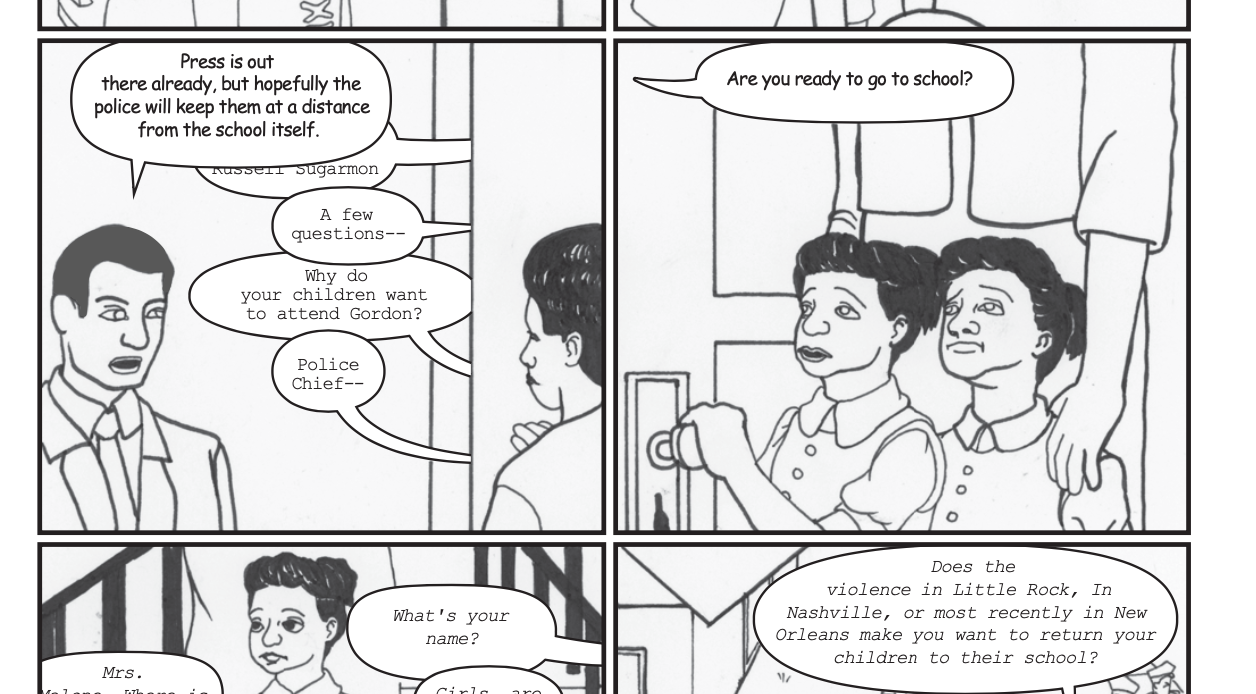Two of the Memphis 13, and Four Periods of Desegregation in the Shelby County School System
WITNESSES TO HISTORY
By Sophia Mason
As a first-year student at Rhodes College, a sociology class clarified so much about my experience in school in Memphis. On top of that I was discovering more and more about Memphis and the history of the South, Ernest C. Wither’s photos, Ida B. Wells, and Reverend Brewster. There was a lot of richness here that I had missed – difficult but also beautiful – so when I heard about a Regional Studies fellowship, I proposed a comic book instead of a research paper.
A comic book would allow me to do the research I was interested in and draw instead of producing a paper. Professor Charles McKinney happened to be a comics fan, and pointed out how the X-men comics drew on civil rights history.
Gordon School came out of my volunteer work at Gordon Elementary in Klondike Smokey City neighborhoods with their art teacher, Whendy Merriman (of Summer Ave. Art and Clay). I had graduated from White Station two years earlier, at a time when the Memphis City School board debated surrendering its charter to the county school system.
Gordon School: An Episode from Memphis illustrates four periods of desegregation in the Shelby County School system, starting in 1961, the year that saw thirteen first-graders integrate 3 schools in Memphis – Bruce Elementary, Rozelle School, and Gordon Elementary – who became known as the Memphis 13. The comic book follows Sheila Malone Conway and her twin sister Sharon Malone (who live in the 38107 zip code today), two of four first-graders to initially desegregate Gordon Elementary, and their first day at school. The story then follows the Black Monday protests that occurred later, the busing controversy – paralleling integration successes all over the country – and the current state of visible segregation we are in again today.
Gordon School is the first comic book to be produced through the Rhodes Institute for Regional Studies Fellowship. Sophia Mason created the script from Daniel Kiel’s Exploded Dream law paper at the University of Memphis, oral interviews with Sheila Malone Conway and Sharon Malone, as well as with Ms. Frankie Walton of the Klondike-Smokey City CDC. It was also created using photograph references from the Ernest C. Withers’ Archive on Beale Street.
Gordon School is presented here in two parts.
Part I: “Everything is in place”
In 1961, as part of the “Memphis 13,” Sheila Malone Conway and Sharon Malone were two of the first, black, first-graders to enroll at the previously all-white, Gordon Elementary School in Memphis, Tennessee.




Unlike the violence and hatred that erupted due to public education integration in other parts of the South, those involved with the Memphis 13 and Gordon Elementary’s integration carried out a plan that proceeded relatively peacefully. Sheila and Sharon also had comparably good experiences while at Gordon, although this is not to overshadow the fear and danger they faced considering what they knew could happen.




By the time Sheila and Sharon entered the fifth grade, in 1964, Gordon School served an almost entirely black student body. That year, black students made up half of all of Memphis City School System, yet less than three percent were attending demonstrably integrated schools. White students had now “fled” to different, predominantly white public schools, private schools, or Shelby County public schools.
Schools in Memphis continue to operate as segregated and unequal communities. “It takes planning and coordination among parties with disparate interests to move a city forward sensibly and peacefully.” (Daniel Kiel, “Exploded Dream: Desegregation in the Memphis City Schools Community,” Law and Inequality 26 (2008), page 302)
Gordon School is presented here in two parts. Click here for Part II.
Sophia Mason is an artist residing in Midtown. She makes art about her religious experience and keeps a blog at sophiamasonart.wordpress.com.



